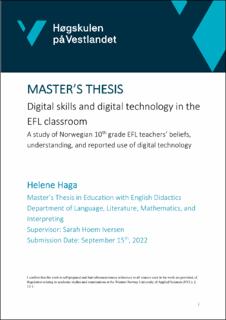Digital skills and digital technology in the EFL classroom: A study of Norwegian 10th grade EFL teachers’ beliefs, understanding, and reported use of digital technology
Master thesis
Permanent lenke
https://hdl.handle.net/11250/3028360Utgivelsesdato
2022Metadata
Vis full innførselSamlinger
Sammendrag
This thesis investigates Norwegian 10th-grade EFL teachers’ understanding and beliefs about the role of digital skills in LK20 and the EFL classroom, as well as teachers' reported use of digital technology. This study draws on theory on teacher cognition, as well as on the pedagogical use of digital technology, such as Ertmer et al.’s (2012) concept of external and internal technology barriers. To answer the thesis research questions, a mixed-method design was applied. An online questionnaire survey was developed based on the literature and sent out to every school in Bergen and surrounding areas. In addition to the online questionnaire, four interviews were conducted using a semi-structured interview technique.
Teachers’ understanding of the term “digital skills” may impact how teachers choose to implement digital skills in teaching. The findings in this study can suggest that the teachers have different understandings of the term, yet there were some similarities. The four teachers’ overlapping understandings of “digital skills” only represent part of what is involved in this concept, suggesting that there are aspects that are less emphasized or even omitted in teaching. Whether or not teachers are aware of these different aspects of “digital skills”, there is still a need for more knowledge about the pedagogical use of digital technology in education. However, it is important to note that accomplishing a successful integration of digital technology does not just necessarily depend solely on teachers’ competence, it requires effort from several parties, such as the institution.
Despite the challenges being discussed, the teachers can be considered to still find the use of digital technology valuable. In other words, even though the teachers find the use of digital technology in education challenging, they also consider it to provide opportunities in teaching. The contradicting responses can suggest that the teachers have conflicting, yet positive beliefs about the role of digital skills in the English classroom. Regarding the reported use of digital technology, the findings in this study can suggest frequent use of digital technology in teaching. However, frequent use does not necessarily mean it is used in a pedagogical way, an observational study could therefore be interesting for future research on the topic.
Beskrivelse
Master’s Thesis in Education with English Didactics
Department of Language, Literature, Mathematics, and Interpreting
Campus Bergen, 2022
Utgiver
Høgskulen på VestlandetBeslektede innførsler
Viser innførsler beslektet ved tittel, forfatter og emneord.
-
Digital zoom of the full-field digital mammogram versus magnification mammography: a systematic review
Øynes, Mona; Strøm, Bergliot; Tveito, Bente Gunn; Hafslund, Bjørg Norunn Rullestad (Peer reviewed; Journal article, 2020)Objectives To summarise and compare the performance of magnification mammography and digital zoom utilising a full-field digital mammography (FFDM) system in the detection and diagnosis of microcalcifications. Methods We ... -
Digital kompetanse sett i system : innstilling frå arbeidsgruppe for digital kompetanse i HSF
Netteland, Grete; Fretland, Jan Olav; Melhus, Alf Tor; Osland, Sara Therese; Parmentier, David; Øien, Knut Erling; Skjeldestad, Kjell (HSF-Rapport;5/2010, Book, 2010)Rapporten er ei innstilling frå Arbeidsgruppe for digital kompetanse, oppnemnd av rektor i januar 2010. Dokumentet skisserer arbeidet med utvikling av ein strategi for digital kompetanseheving hjå studentar og tilsette i ... -
In or Out of School? : Meaningful Output with Digital and Non-digital Artefacts within Personal English Learning Ecologies
Cabot, Michel (Journal article; Peer reviewed, 2016)This paper integrates ecological perspectives with language development theories to elucidate students' self-perceived learning trajectories. It presents data from focus, in-depth and member checking interviews with three ...

